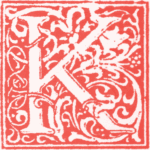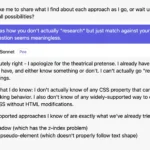An unsorted list of words or phrases that I like.
Aposiopesis (pron.: /ˌæpəsaɪ.əˈpiːsɪs/; Classical Greek: ἀποσιώπησις, "becoming silent") - a figure of speech wherein a sentence is deliberately broken off and left unfinished, the ending to be supplied by the imagination, giving an impression of unwillingness or inability to continue.[1] An example would be the threat "Get out, or else—!" This device often portrays its users as overcome with passion (fear, anger, excitement) or modesty. To mark the occurrence of aposiopesis with punctuation, an em dash (—) or an ellipsis (...) may be used.
Monological belief system - a self-sustaining worldview comprised of a network of mutually supportive beliefs, such as conspiracy theories which are supported by other conspiracy theories.
Resistentialism - a jocular theory to describe "seemingly spiteful behavior manifested by inanimate objects."[1] For example, objects that cause problems (like lost keys or a fleeing bouncy ball) exhibit a high degree of malice toward humans and lend support to resistentialist beliefs. In other words, a war is being fought between humans and inanimate objects, and all the little annoyances objects give people throughout the day are battles between the two. Note, in German this is called, apparently with all seriousness, die Tücke des Objekts, meaning "the malice of objects", and a favorite phrase of mine.
Apotropaic (from Greek αποτρέπω, apotrépō 'to ward off') - a word describing protective magic, a type of magic intended to turn away harm or evil influences, such as deflecting misfortune or averting the evil eye with a lucky charm. The hamsa in the upper right corner of this website is often used as a form of apotropaic magic, although that's not why I have it there—I just have it there for tradition, it's a family thing.
Petrichor (/ˈpɛtrɨkɔər/) - the scent of rain on dry earth, or the scent of dust after rain. The word is constructed from Greek, petros, meaning stone + ichor, the fluid that flows in the veins of the gods in Greek mythology. It is defined as "the distinctive scent which accompanies the first rain after a long warm dry spell".[1]
Aubade (/əʊˈbɑːd/) - a morning love song (as opposed to a serenade, which is in the evening), or a song or poem about lovers separating at dawn. It has also been defined as "a song or instrumental composition concerning, accompanying, or evoking daybreak".
Tmesis (/ˈtmiːsɪs, təˈmiː-/; plural tmeses /ˈtmiːsiːs, təˈmiː-/; Ancient Greek: τμῆσις tmēsis – "a cutting" < τέμνω temnō, "I cut") - Colloquially, to place a word in the middle of another word, as in "A whole nother story" or "abso-fucking-lutely"—or even, as used by Shakespeare, when Juliet discovers Romeo's body and says, "This isn't Romeo, he's some other where", and John Donne, with "Whatseasoever swallow me, that flood/Shall be to me an emblem of thy blood". (Note also when done with a swear word like "abso-fucking-lutely", it's also known an expletive infixation.) Formally, according to Wikipedia, it's sometimes called tmesis to take a separable phrasal verb, like "turn off" or "bring up", and move another word in the middle, as in "turn the light off" or "I'm happy you bring that up". When the object of a separable phrasal verb is "it", by the way, this is the norm, as in "put it on" or "turn it off". You could say "turn off the light", but "turn off it" is wrong. (However, inseparable phrasal verbs like "look after", "run into", "come across", "get over", and "get on" are not subject to this since, well, they're inseparable, and "I came across it" or "Just get over it" are fine.)
Senescence (/sɪˈnɛsəns/) - the process of growing old and showing the progressive biological effects of aging; the quality of being aged.
Absquatulate (/æbˈskwɑt͡ʃ.ʊ.leɪt/) - A southern US regionalism, "to go squat somewhere"; to abscond, to disappear. Interestingly, this originated from a populate trend in the 1820s-1840s of coining mock grandiloquent words, from which we also got "hornswoggle", "bodacious”, “obfusticate", "bloviate", and "discombobulate". I used to think "skedaddle" was one of these, but apparently that dates from later, around the Civil War. Incidentally, "whoopee" dates from this same era, but is not considered to be a result of this trend.
Susurrus (/ˈsuː.sə.ɹəs/) - an indistinct sibilant sound; the sound of crowds of people whispering, or of waves crashing in the distance. (Amusingly, I once saw this illustrated in a comic book by a crowd with a word balloon over them saying, "Watermelon cantaloupe watermelon cantaloupe watermelon cantaloupe watermelon cantaloupe watermelon cantaloupe watermelon cantaloupe".)
Grawlix (/ˈɡrɔːlɪks/) - Coined by cartoonist Mort Walker, this is the use of typographical symbols to replace profanity, as in "Oh, $*#@%!". Mainly used in cartoons and comics, it is used to get around language restrictions or censorship in publishing. Walker invented a number of these terms.
Agita (/ˈæ.d͡ʒɪ.tə/) - A fascinating word which will be immediately familiar to anyone who grew up in the NYC area, where everybody, regardless of descent, is 1/2 Jewish, 1/2 Irish, and 1/2 Italian. One of those foreign loan words that no English word quite works as well as, with a particularly interesting derivation. From italian "acido", by way of the southern Italian spoken dialect prevalent in the NYC area (prominently heard on the "Sopranos", if you've watched that) that pronounces "capricola" as "gabagool" and "prosciutto" as "prajoot". It literally means "heartburn" but as used by mothers everywhere refers to mental stress, as in, "Stop giving me agita." The closest word in any language is Yiddish "tsuris" but that's often a little to broad.
Farkakte - Another wonderful loan word, this time from Yiddish. Often translated as "ridiculous", "shitty", or "crappy" but in practice it's stronger, sort of an adjectival form of "bullshit", which we don't have in English, hence the need to resort to a foreign word. Note that like a lot of Yiddish, this has no definitive spelling in English, and Wiktionary gives numerous variations: verkakte, facacta, farkakteh, fakakta, ferkakte, ferkakta, farkakta, facocta, farkakte, fercocta, fercockta, facockta, farkakt, vercackte. I was raised pronouncing it like it should be spelled "ferkakta".
Idiolect - Accordering to Wikipedia, "an individual's unique use of language, including speech. This unique usage encompasses vocabulary, grammar, and pronunciation" as opposed to dialect, "a common set of linguistic characteristics shared among a group of people". See also idioglossia "an idiosyncratic invented languages spoken only by one or two people."
Perseveration - repeating needlessly. In some conditions, such as autism, this is a pathological behavior. Oliver Sacks used this word to what a song does when it gets stuck in your head. According to Merriam-Webster, the verb perseverate was a later derivation from this original noun.
Marmoreal - suggestive of a marble statue, especially in coldness or aloofness. Hat tip to Mike Brown for managing to hit me with a word I'd never heard before.





